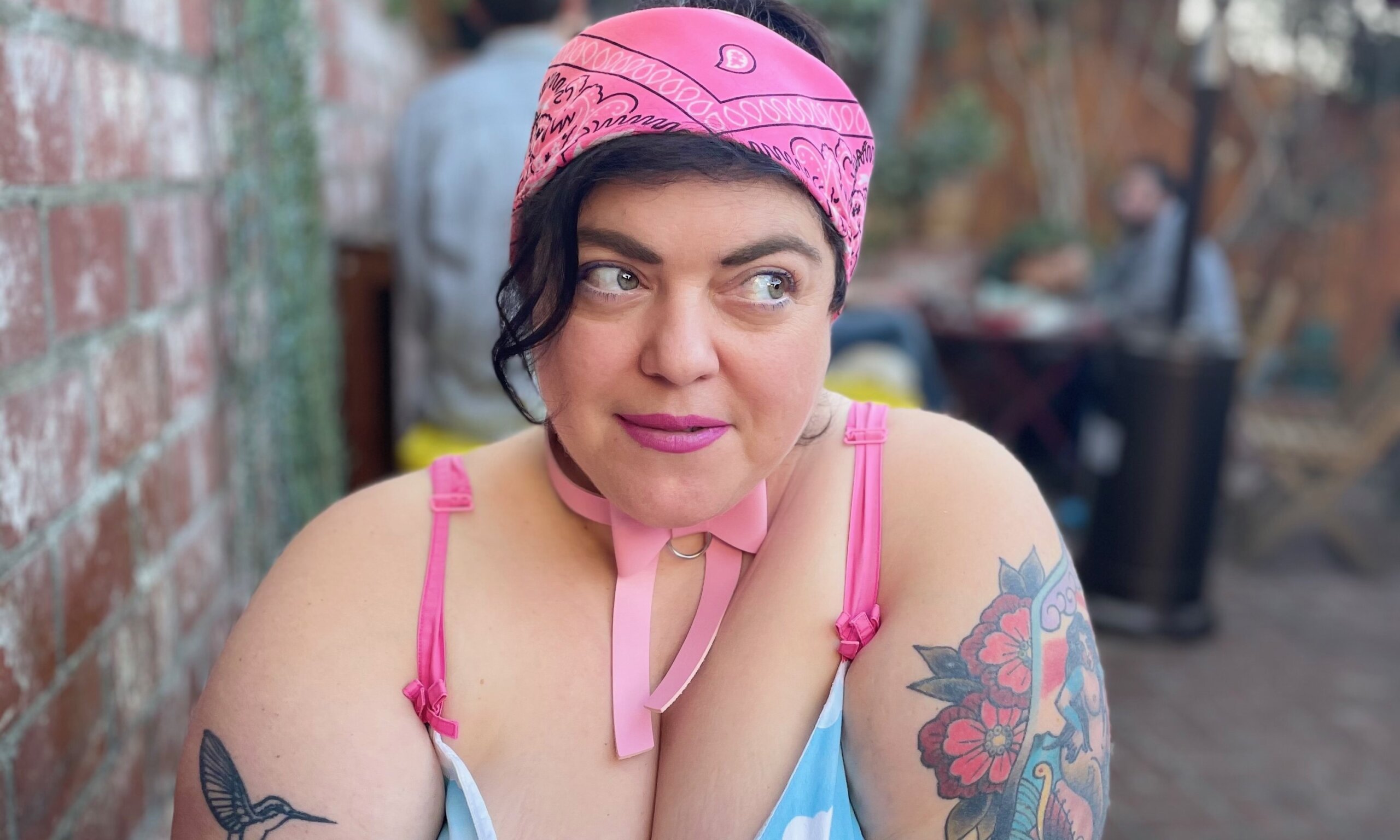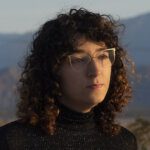A dental emergency clinic in Marfa. A hotel room in Oklahoma City. A series of billboards around the city of Springfield. Love Is an Ex-Country, a new memoir from Arab-American queer femme writer Randa Jarrar, guides the reader through the landscapes of America in the immediate aftermath of Donald Trump’s election as president. In her third book, and first of non-fiction, Jarrar maps out a journey that connects many disparate locations from across the U.S., from queer sex parties in BDSM dungeons to racist patrons in rundown gas stations.
The political realities of America in 2016 set an important backdrop for the events of the memoir, and sitting atop this context is an exploration of the relationship between space and memory. The book doesn’t attempt to attribute meaning and reason to the politically fragile country; it’s more interested in the ways movement across space and time can hold a mirror up to a weary traveller.
The chapters are wound together tenderly and carefully in the recounting of a drive across the U.S. that Jarrar undertook in 2016, winding from Arizona to Connecticut. The narrative is too restless to keep its focus on the road, and instead leaps along with the caprices of the driver’s memory and imagination. The irregular quilt of memories, thoughts, places and people that constitute Love Is an Ex-Country wraps around the reader tightly, the shift and swerve of the narrative oriented towards total immersion. With her topsy-turvy, in-motion narrative, Jarrar captures the sensation of meditating on one’s life while moving across a landscape.
Xtra caught up with Jarrar virtually while she reclined regally on the couch in her California apartment. We spoke about her new memoir, the importance of staying true to one’s voice and the colonial underpinnings of the road trip story genre.
Your novel and first book, A Map of Home, and your new memoir, Love Is An Ex-Country, address different parts of your life. How do you imagine these texts fitting together?
I feel like all of my books are meant to be read together to get more of an idea of the ways that I use my autobiographical texts to create stories of multitudes, characters that can represent different aspects of the self. But with this book, in particular, it’s just a lot more raw. With my fiction, there’s a huge process to separate myself from a narrator or protagonist. This book was a concentration of five years of my life, whereas A Map of Home is 16 years of my life, so I felt like I had more space here to get into the smaller more painful things. With A Map of Home I was trying to write a comic novel, though there’s still a lot of pain and abuse that I try to talk about in that book. But with Love Is An Ex-Country I didn’t really worry about whether it was palatable.
What was behind this choice to take a more direct, less fictionalized approach?
I really enjoy writing non-fiction. I love writing fiction, too, don’t get me wrong. But with Love Is an Ex-Country, I had already written two books that tried to tackle the subjects through fiction, and neither of them really worked. They didn’t match my vision for what I wanted to say, which was basically, “Leave us the fuck alone.” Stop trying to tell us who we are, what to do with our bodies, how to love each other and ourselves. So this book was more of a massive stop sign that I wanted to make, rather than a neatly arranged narrative of the pain and rejection that I felt in those years.
If you think that this book accomplished getting that vision out into the world, then what comes next?
I am really interested in film and cinema and thinking of the ways that I can create a story beyond just words, with actors and visuals and music and all of that. I’m trying to develop this feature and make it at some point in my life. I’m also writing a kind of utopian queer future novel. I feel a lot more liberated from the pain of my own story, and like I can move forward with the kinds of things I was trying to do with my second book, which is to inhabit tons of different characters in different places.
If the main message you were trying to convey was “leave us the fuck alone,” what comes after that in terms of messaging?
How can we now build? Those of us on the margins, who are queer: How do we build a world that is going to suit us, because the world is not built for us? How do we move forward to create the kind of world that we want to live in, that we hope for? If we were in charge, what would we do? Seeing the ways that younger people are fighting and calling each other in, and being so honest and badass, has been really inspiring to me.
Can you speak to your decision to structure the book around an American cross-country road trip?
There’s this cis white man idea of what an American road trip is like, which is like “we did a bunch of drugs, and we drove down the Pacific Highway, the world is our oyster, this country is our landscape.” A ton of erasure of other people’s stories and histories, and a total dishonouring of the land that the settlers are on and writing about. And then there’s this other trend of white women writing about going on road trips or going on hikes, conquering nature to learn something about themselves. Whereas for me, I wanted to show the ways in which someone with PTSD getting in a car and going somewhere isn’t just a trip from A to B. I start driving, but then I remember something that happened in the past, or something that will happen that I’ll be punished for, or whatever it is. Those intrusions inform the idea of the road trip, of how you move through the world. A lot of the time, that’s dictated by how much responsibility you want to take while making that movement, but also how much privilege you have.
“I wanted to show the ways in which someone with PTSD getting in a car and going somewhere isn’t just a trip from A to B.”
I loved creating it as a structure, to on the surface be like, “Look, it’s an all-American road trip,” but then you go in and you’re like, “Oh, no, this is about a fat Palestinian femme who is gonna deal with all of these PTSD episodes, and all this pain and trauma, all by herself, and she’s going to talk about things in a nonlinear way and make the reader possibly uncomfortable.” And then the reader’s job is to sit in that discomfort if they don’t understand that background, or else revel in the mirroring that might happen if they’ve also experienced something similar. I wanted it to work with everyone in different ways on different layers.
Are there any pieces of media or perspectives that play with the genre of the road trip that you looked to for reference or inspiration?
I really love poetry. That was probably the number one thing about the time I was writing this book. These aren’t necessarily road trip things, but I was reading Claudia Rankine’s Citizen, Adrienne Rich’s non-fiction and Audrey Lorde’s non-fiction, specifically The Cancer Journals. Lorde talks about travelling to different parts of the world, the ways that she is perceived as a butch Black woman and the ways that others in those places who were also Black and butch perceived themselves and each other. All these ways that she moved through the world and reported exactly what was going on.
When you were actually writing the book, what was your writing process like?
For the opening of the book, I really wanted to talk about [famed Egyptian dancer] Tahia Carioca. She’s this 1940s badass. And she endured, she kept working into her old age. People like to compare her to men or to people who weren’t able to endure or to white women who were a lot smaller than her, and we’re not able to enjoy the way she had such a huge career and life. I did a ton of research to see where she had stopped during her stops, because I knew that she drove cross country. I was, like, “What is this? How did she do this in the ’40s?” And then throughout the five years of writing the book I took notes around major events. So 2014 was the summer when Ferguson [the Missouri town where white police shot Michael Brown, an unarmed Black teenager] was happening, and in 2015, there was a lot more around the movement. I started recording all those events, like the Pulse nightclub shooting [when 49 people were killed in an Orlando, Florida, nightclub]. It was helpful to write about who I was in those moments. It was a mix of live notes, but also reflections.
I’m wondering about the title—how do you see its message fitting into the book?
I wanted it to be called x, just an “x.” That was my playlist title when I was listening to music while I was writing. But then I was thinking about what I was trying to say. I’m trying to talk about what love is, in a subjective way to me, right? So I wrote so many different titles: Love Is Palestine, Love Is Knowing that You Belong in Palestine that Can’t Be in Palestine, all of these different titles. And then I thought about Palestine as an ex, Palestine as the ever-elusive home. And then it’s also cross-country, x-country as crossing. And I love the “x” too, as something that signifies a departure from binaries.
Throughout the book, you speak about a number of very strong reactions to your writing. Have these reactions informed how you write—making you more bold or otherwise?
I think the scariest thing for me about those reactions is I didn’t want them to kill my speech. I read about ways that, when you’re a person online and you have a collection of marginalized identities or intersections, more people are going to shit on you. And one of the effects of that is that you end up chilling your own speech; we end up self-censoring. I’ve been reading about this since I was getting my master’s degree in Middle Eastern literature, reading about the ways that political dissidents write in the homelands. They had to get really creative because they wanted to write about presidents, but they couldn’t actually name the people that they were dissenting against. So instead of self-censoring, they found these really cool ways to talk truth to power. And some of them ended up getting in trouble anyway and going to jail—especially in Egypt with women writers. I feel like I come from this history, right? We come from people who can’t help but tell the truth. So for me, the biggest concern was not to self-censor, and to stay true to my voice as a writer. So I don’t think it makes me bolder, but I feel like that’s just how I write and I’ve always written this way. But it does make me want to fight more. I’m not just gonna disappear.
I was reading the Cicely Tyson quote, “May she rise in power,” from her new memoir where she talks about how the greater you are, the more threatening you are, and the more you’re going to attract that kind of anger from people who don’t want you to rise like that. So in a lot of ways it just affirms my power rather than strips it.


 Why you can trust Xtra
Why you can trust Xtra


